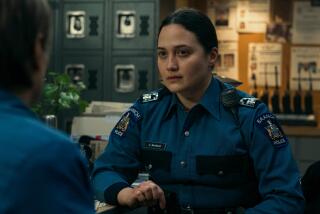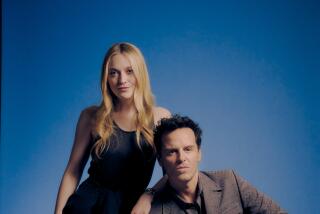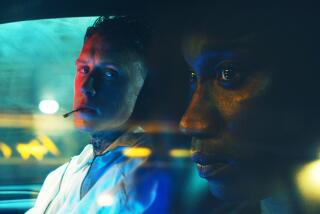Phoebe Waller-Bridge finds God and naughty glee in ‘Fleabag’s’ second season
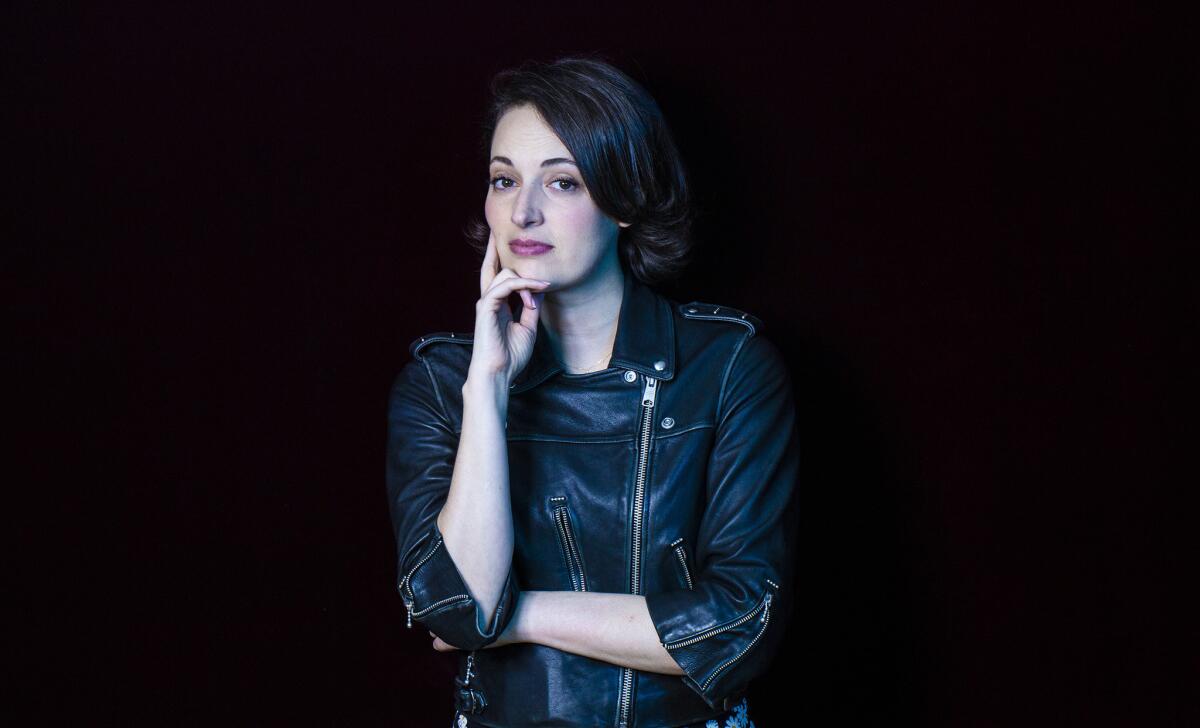
When Phoebe Waller-Bridge was making “Killing Eve,” the spy thriller she created for BBC America, she kept a draft email on her phone. It listed jokes, ideas and observations she hoped to use in the second season of her other current series, the darkly comic “Fleabag.”
When she finally pulled up the email on her phone, she was shocked that 60% to 70% of what she had written down involved religion, faith, morality in the modern world — “lots of hilarious jokes about that,” says Waller-Bridge, who bursts with expressiveness. A rapid-fire talker with big eyes, nimble brows and bobbed hair of a silent film star, she also uses wild hand gestures, cartoonish voices and an array of evocative sounds to make a point.
“I just find it so moving, that sense of faith, belief, certainty,” she says over lunch near Union Square. “As a generation it’s not very cool to believe anything. But the appeal of basic Christian principles — which is basically be nice to people, don’t be a dick, don’t kill anyone — does get lost.”
Adapted from her one-woman stage play, the first season of “Fleabag” was a delightfully filthy portrait of a single London woman (never named but identified as Fleabag in the credits) who narrates her wild bedroom escapades directly to the audience. Writer and star Waller-Bridge lures the audience in by playing the role of oversharing best friend, then guts them with a shock revelation about the grief and guilt underlying her character’s outrageous sexual bravado.
The long-awaited second — and, she insists, final — season of “Fleabag” arrived earlier this month on Amazon and once again flouts expectations. Now earnestly trying to right her past wrongs, Fleabag struggles when she unexpectedly falls in love with the Catholic priest (Andrew Scott) officiating her father’s wedding. What might have played like a soapy stunt — libidinous vixen seduces a celibate man of the cloth — is instead rendered as a deeply humanizing and poignant story of two people derailed by their profound connection.
Critical praise for the quiet perfection of “Fleabag’s” end run has almost managed to rise above the clamor over the uneven final season of “Game of Thrones.” But it is just one of many reasons the 33-year-old Waller-Bridge seems to be everywhere at the moment.
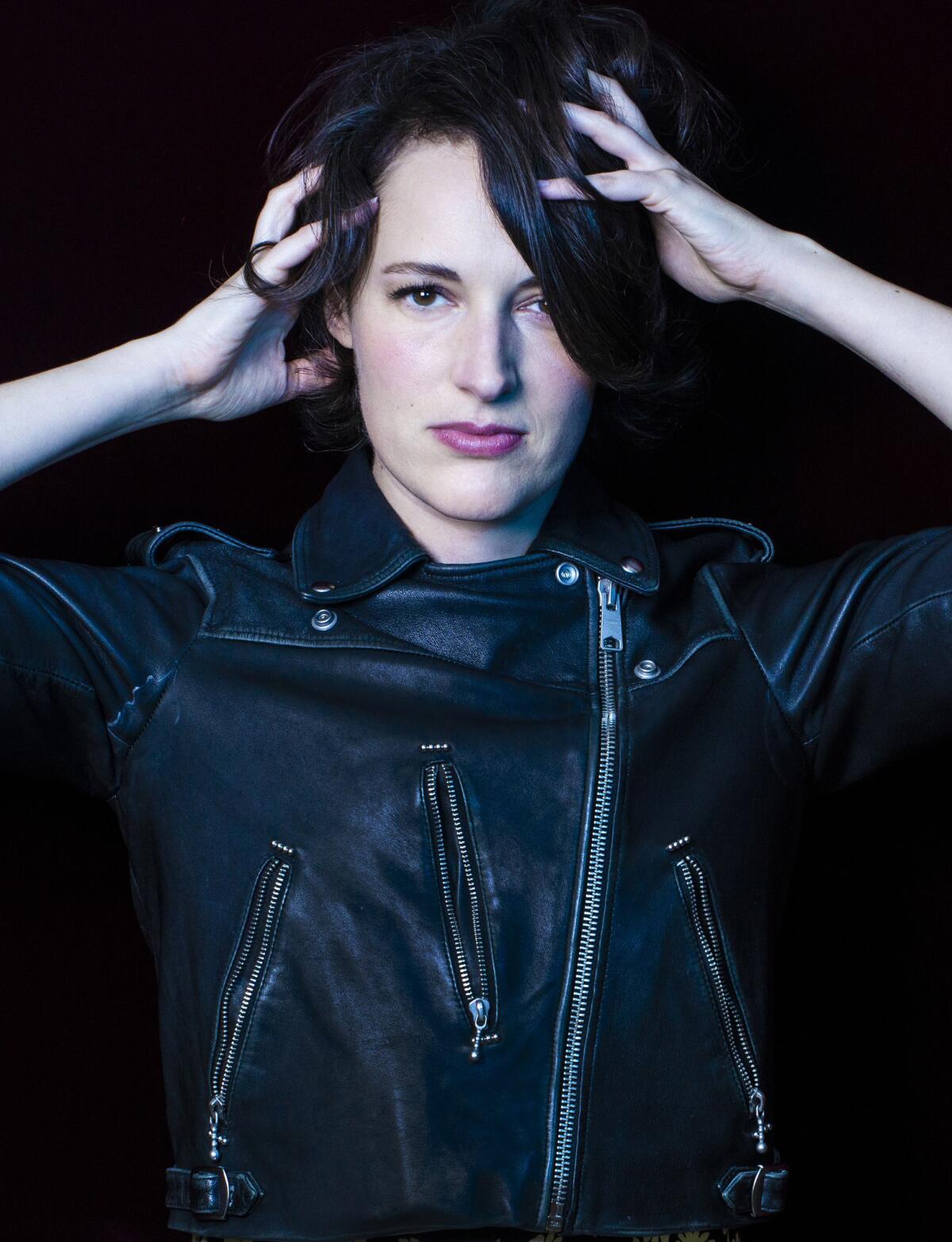
REVIEW: Spy vs. assassin? It’s a pure and perverse matchup in BBC America’s ‘Killing Eve’ »
The second season of “Killing Eve,” winds down Sunday. She is currently punching up the script for “Bond 25,” the latest James Bond film and, one presumes, bringing some female perspective to a franchise that could sorely use it. And she’s executive producing and starring in “Run,” a comedy picked up last month by HBO and created by her best friend, Vicky Jones. Finally, after a sold-out off-Broadway run in New York this winter, Waller-Bridge will bring a revival of the stage version of “Fleabag” to London in August.
“Then we’re done,” she says of her Fleabag alter-ego. “I swear!” But you almost hope she’s lying.
‘How dare I?’
“This is a love story,” says Fleabag in the opening minutes of the second season. And while she’s talking about the events that follow, she might as well have been describing the origins of the show itself, which grew out of the friendship and creative partnership between Waller-Bridge and Jones.
It all began when Waller-Bridge, a graduate of the Royal Academy of Dramatic Art, “was scrabbling around trying to get anyone to give me any kind of job and failing massively,” she recalls. One night she introduced herself to Jones, who was directing her then-boyfriend in a short play, and, by Waller-Bridge’s account, blubbered incoherently about being an actress.
In an email, Jones remembered the meeting somewhat differently. Waller-Bridge, skinny and tall with a “Bambi quality and the sort of charm that makes you sense that you’re blushing,” shyly handed her a copy of her resume folded into quarters. Jones “felt utterly flattered … since she was clearly way cooler than me.”
REVIEW: Not just a millennial Bridget Jones, ‘Fleabag’ gives the female narrator a whole new voice »
The director soon cast her in a play, but then got fired. Waller-Bridge quit in protest and the two women went to the pub to vent. “It was the best thing that never happened to us,” Waller-Bridge says. “We didn’t really know each other and we got absolutely hammered talking about what we love, about what we do even though no one would give us a job doing it.” The commiseration session led them to found their theater company, DryWrite.
The idea for “Fleabag” emerged when Waller-Bridge was invited to take part in a storytelling festival. She was initially reluctant, never having written anything herself. But at Jones’ encouragement, she decided it was time to put her money where her mouth was and just do it. She wrote a 10-minute monologue, peppered with jokes about eating “very slutty pizza” and masturbating to Barack Obama. It was designed for an audience of one.
“I really focused on how me and Vicky really speak to each other, how much we confide and trust each other. What if I spoke like that to an audience but with the promise that I’ll make it funny every single step of the way? And that’s what kind of unlocked it.”
The sketch was “a perfect example of Phoebe’s razor-sharp wit and enormous heart,” says Jones, who directed the hour-long stage version that became a sensation at the Edinburgh Fringe Festival in 2013.
Waller-Bridge suspects she and Jones “forced” each other to become writers — something they both “probably always wanted to be secretly but didn’t admit to.”
ALSO: Sandra Oh on making Emmy history, ‘Killing Eve’ and the joy and grief in feeling recognized »
“It’s such a vulnerable leap to write something that’s fiction. But also that feeling of like, how dare I? Who am I to write a story ? I certainly felt like that. That little moment of permission, who gives you permission to do it, is such a thing,” Waller-Bridge says.
In both the stage and television versions of “Fleabag,” Waller-Bridge cultivates a deep sense of intimacy with the audience by speaking directly to them. Fleabag is initially sympathetic, struggling to keep her quirky guinea-pig themed cafe open after the death of her best friend, Boo, in an apparent suicide. But the audience’s trust in Fleabag is violated when it’s revealed that — spoiler alert — Fleabag slept with Boo’s boyfriend. Suddenly, her sexual antics seem more pathological than amusing.
“That’s the thing I found was most dangerous about it and the most exciting, was the betrayal, saying, ‘Come on in, my life is going to be amazing. I’m going to tell you this hysterical story, and we’re going to have a [bleeping] great time,” says Waller-Bridge. “And then halfway through, you start to know her too much. You feel duped. That relationship changes.”
In person, Waller-Bridge also gives off an enabling, conspiratorial vibe when she offers a bite of her shrimp salad. “Go on, have a prawn! You know you want a prawn!”
“Fleabag” isn’t the only recent show in which female protagonists convey their thoughts to the audience — whether through narration (“The Handmaid’s Tale”), direct address (“Gentleman Jack”) or song (“Crazy Ex-Girlfriend”). “Being able to play with subtext like that is a really great way into showing how a lot of women have to exist because of the performative element of being a woman. There were so many secrets about womanhood, the female experience that weren’t really spoken about on TV,” Waller-Bridge says.
ALSO: Phoebe Waller-Bridge takes a walk on the droid side in ‘Solo: A Star Wars Story’ »
‘Naughty glee’
On paper, “Killing Eve” — one of last year’s best-reviewed new shows, earning Emmy nominations for Waller-Bridge and star Sandra Oh — is completely different from “Fleabag.” Based on novellas by Luke Jennings, it’s a spy drama about Eve Polastri, a bored intelligence agent (Sandra Oh) on the hunt for Villanelle, a charmingly psychopathic assassin (Jodie Comer).
But the series is also “deliciously rude,” says Oh. “There’s always such glee, delicious glee, naughty glee to Phoebe’s work. And to her as a person.”
And like “Fleabag,” it also understands on a fundamental level how women speak to — and look at — each other. By way of example, Oh says Waller-Bridge was “obsessed” with her curly hair, and wrote it into the script.
“With everything that’s going on in the news, I just think, what an unbelievable privilege to have this creative realm where we can explore two women making choices. I’m extremely aware of the privilege that it is,” Oh says. “And also, I believe, how important it is. You have no idea what a ripple effect it has.”
ALSO: ‘Killing Eve’s’ Jodie Comer on her bewitching killer Villanelle — and Bruce Springsteen »
Before Waller-Bridge was ready to make another season of “Fleabag,” she had to figure out what to do about the camera. Season 1 had been “a cover-up” she says. Now that viewers were wise to Fleabag’s deception, she had to find a new, more truthful way for her character to relate to the audience.
Without spoiling the details, “Fleabag” finds a new way to play with the fourth wall, one that adds to her confusing feelings for the Priest (who has no name either).
“I thought it would just crash Fleabag’s brain, meeting someone who’d given up all the — not even hedonistic — pleasurable aspects of life and found himself happy, found himself certain, and yet connected with her on an animal human level. These two people that just go click and yet have completely different views on life.”
Since “’Fleabag’ is just a walking guilt machine” it also felt thematically appropriate to explore Catholicism, which, she says, “is steeped in guilt.
ALSO: ‘Fleabag’s’ Phoebe Waller-Bridge rides a career launched by a 10-minute sketch »
Once she had the initial idea, she met with Scott, an old friend she’d starred with onstage years earlier. He took her to a Quaker meeting house in central London, where they spent three hours “talking about love and relationships and sex.” (The same Quaker meeting house provided the location for one of Season 2’s most memorable scenes.) Waller-Bridge also attended 30-minute flash masses at a church near Soho Square. The first time, she “instantly got the hysterical church giggles.” But by her third visit,“I started getting really scared. What if it’s true? And I guess that’s the beginning of it getting into my head.”
Though she describes herself as an atheist, Waller-Bridge “hopped around a bit from religion to religion” while growing up in London. Her mother worked down the road in a vicarage for the Church of England. She sometimes played drums for the church. (“Can still do ‘Kumbaya,’” she deadpans.) Later on, she went to Catholic school and remembers being “haunted” of pictures of Jesus hanging on the cross. “He’s always naked and being stroked by people.”
Given how much thought Waller-Bridge has put into the camera and its placement, it’s not surprising she’s already plotting her next project: a movie she will write and plans to direct. But that’s all she’ll say about it — for now.
“I haven’t spoken about it out loud. I might say it out loud and it might be a terrible idea. It’s quite nice having it in the back of my head for now.”
Maybe. But if the past is any indication, it probably won’t stay there for long.
See the most-read stories in Entertainment this hour »
Follow me @MeredithBlake
More to Read
The complete guide to home viewing
Get Screen Gab for everything about the TV shows and streaming movies everyone’s talking about.
You may occasionally receive promotional content from the Los Angeles Times.
